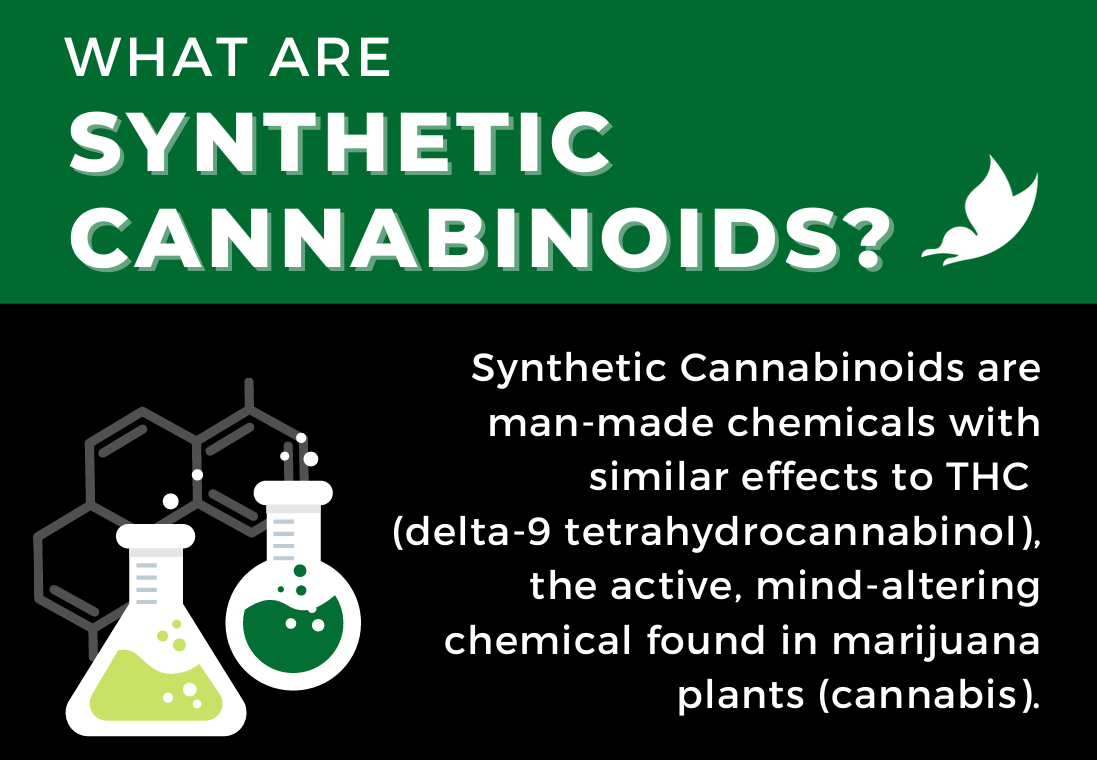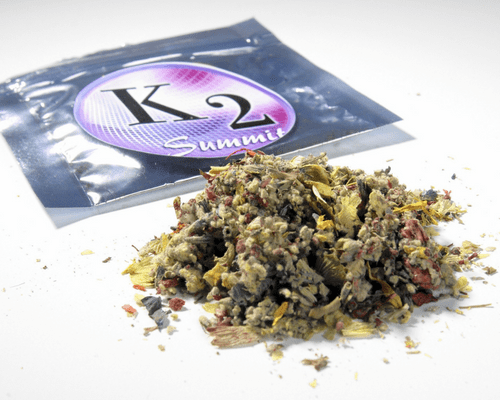Synthetic cannabinoids go by many names–“K2,” “Spice” and “Synthetic Marijuana” to name a few. You can find hundreds of these novel psychoactive substances (NPS) for sale in colorful foil packages and plastic bottles on the Internet, at your local gas station and in smoke shops. At one point, they were even accepted by teenagers and young adults as “safe” and “legal” alternatives to marijuana.
Synthetic cannabinoids may also present an opportunity for people to walk the line between getting high and dodging trouble. For example, synthetic cannabinoids imitate the mind-altering effects of marijuana but are not as easy to detect on standard drug tests. Therefore, people smoke or vape them to avoid failing a drug test at their new job, a rehab center or probation office.
The reality is thousands of people have ended up in emergency rooms through the years due to synthetic cannabinoid poisoning. As a result of false advertising on packaging, people don’t always know what to expect when they smoke or vape a batch of synthetic cannabinoids. Therefore, consuming an overly powerful mix can leave users feeling sick, displaying violent behavior or having dangerous hallucinations.
Synthetic cannabinoids are highly addictive, and the psychoactive effects can pose long-term dangers to the mental and physical health of users. But at Landmark Recovery, our medical staff monitors patients during withdrawal for any harmful effects, returning their bodies to a stable and healthy condition. Then, our licensed therapists can help those addicted to synthetic cannabinoids identify triggers as they strive to achieve long-term sobriety.

Synthetic Cannabinoids are man-made chemicals with similar effects to marijuana. Click the picture to download our FREE Infographic.
What are synthetic cannabinoids, aka “synthetic marijuana”
Synthetic cannabinoids are man-made chemicals with similar effects to THC (delta-9 tetrahydrocannabinol), the active, mind-altering chemical found in marijuana plants (cannabis). Synthetic cannabinoids are usually sprayed onto herbs or dried plant material and sold in colorful foil packages and plastic bottles. In 2014, 177 different synthetic cannabinoid chemicals were made available, according to the National Institute on Drug Abuse.
Synthetic cannabinoids are also consumed in the following ways:
- Mixed into a liquid and vaped in e-cigarettes
- Added to herbal teas or food and swallowed
Many synthetic cannabinoids are illegal, so manufacturers switch up their brand mixtures to stay ahead of the law. For this reason, the chemicals in one brand may change from batch to batch, even if the packaging doesn’t. Many people who use synthetic cannabinoids are just trying to get high, but may end up experiencing bad side effects instead, even if they don’t smoke a large amount.

Himalayan Spice incense sold online (Source: DharmaShop)
Street names
In 2008, synthetic cannabinoids first appeared on sale in the United States. The mind-altering drug is marketed under many different names, like “Kronic,” “Northern Lights” and “Blaze.” However, American teenagers leaned more towards the mixes called “K2” or “Spice,” as synthetic cannabinoids became the second-most popular illegal drug among their age group in 2012.
During the same year, 11% of high school seniors reported past-year usage of synthetic cannabinoids (referred to as synthetic marijuana). Synthetic Cannabinoids are also marketed and sold as herbal teas, liquid incense and dried, shredded plants that look like potpourri.

K2 Summit synthetic marijuana (Source: Indiana Department of Health)
Signs and symptoms of synthetic cannabinoids
The effects synthetic cannabinoids have on the human body have always been a mixed bag of symptoms affecting the user’s behavior and mind. People usually smoke synthetic cannabinoids and can feel their mind-altering effects within minutes. Similar to marijuana, synthetic cannabinoids can have the following effects on users:
- Relaxation
- An elevated mood
- Disorientation
- Symptoms of psychosis
Despite synthetic cannabinoids acting on the same brain cell receptors as the THC found in marijuana plants, researchers have found the side effects of synthetic cannabinoids to be more potent than marijuana. Because the chemical makeup varies from batch to batch, synthetic marijuana may affect the user’s brain even worse and threaten their long-term health, giving them the following negative symptoms:
- Extreme anxiety
- Confusion
- Paranoia
- Hallucinations
Physical and mental symptoms of withdrawal from synthetic cannabinoids include:
- Nausea
- Extreme anxiety
- Irritability
- Mood swings
- Insomnia
- Decreased appetite
- Intense cravings
The difference between natural and synthetic cannabinoids
Synthetic cannabinoids are not the same as marijuana plants. Both substances have psychoactive, mind-altering effects, but the chemicals producing these effects have different makeups.
Marijuana, or the cannabis plant, contains more than 500 cannabinoids, or chemical compounds. When people smoke or ingest marijuana that’s been heated at a high enough temperature to affect the user and get “high,” they’re experiencing the effects of delta-9-tetrahydrocannabinol (THC), the main cannabinoid in the natural plant. Synthetic cannabinoids are man-made chemicals that are either sprayed onto various dried plant materials or sold as liquids to be vaporized.
While the chemicals found in natural marijuana plants can be used for varying medical purposes, the chemicals in synthetic cannabinoids are made in a lab, have no medical benefits and have a high potential for abuse. Because manufacturers have tried to sidestep regulations against some of the chemicals in synthetic cannabinoids, each batch can be unpredictable and cause toxic effects to human behavior and the mind.
Can you overdose on synthetic cannabinoids?
Overdoses happen when a person’s body has a negative reaction to taking too much of a given substance. In the case of synthetic cannabinoids, misleading packaging and false advertising can leave people unaware of what they’re smoking or consuming. Not to mention, knowingly or unknowingly taking synthetic cannabinoids in combination with synthetic opioids like fentanyl can also trigger a drug overdose or even lead to death.
All 50 states have reported negative health effects in people who used synthetic cannabinoids. In 2015, poison centers nationwide received 7,794 calls about adverse health effects in people using the drug. Varying effects caused emergency room visits due to the abuse of synthetic cannabinoids, including:
- Rapid heart rate
- Vomiting
- Violent behavior
- Suicidal thoughts
- Respiratory depression
Learn more about addiction treatment for synthetic cannabinoids
Much like other powerful drugs, it is possible to become addicted to synthetic cannabinoids. People who’ve tried to quit taking the drug in the past have reported the same withdrawal symptoms as those who became addicted to marijuana.
At Landmark Recovery, we help people overcome their addiction with an accredited treatment program. We provide the opportunity for patients to enter one of our rehab centers, go through behavioral therapy and attend counseling with our licensed therapists. If you or someone you love is wrestling with an addiction to synthetic cannabinoids, call 888-448-0302 to talk to a recovery specialist and go over your treatment options.

Choose Recovery Over Addiction
We're here 24/7 to help you get the care you need to live life on your terms, without drugs or alcohol. Talk to our recovery specialists today and learn about our integrated treatment programs.




